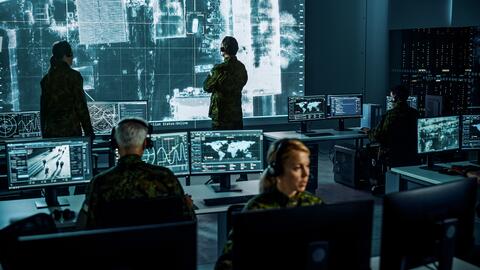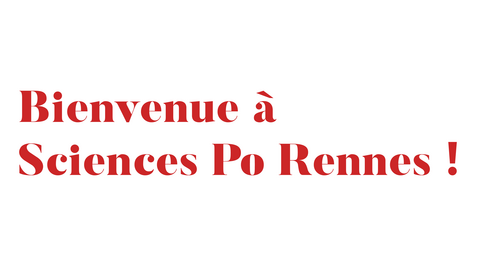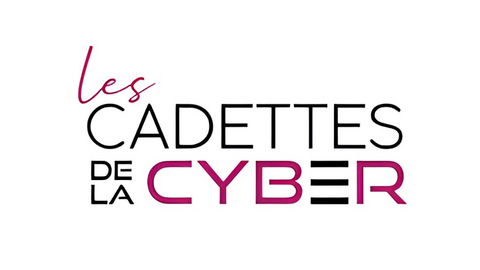The Master in Security, defense and strategic intelligence (SEDEFIS) gives professionals the tools they need to play a role in effective high-level decision-making in any military context.

In a world of increasing complexity in the security environments of States and of the European Union, an excellent grasp of analysis techniques and adapted reasoning is essential at every level of government and business.
This program gives professionals the tools they need to play a role in effective high-level decision-making in any military context. Students learn how to acquire key knowledge; process information in a dynamic and constructive continuum; identify challenges and propose possible avenues, and draft pertinent and realistic proposals.
A historical approach to international relations and major shifts in organizations, together with an advanced command of national, European and international frameworks; international humanitarian law; and national and European defense and common security policies provide insight into issues from all angles. A solid understanding of the different mechanisms used to manage national, European and international crises and of the role of international organizations gives students key insight to understand and interpret the current international environment and trends.
Students explore contemporary issues using a global and multidisciplinary approach supported by learning acquired in the first years of study at Sciences Po and enriched by a wealth of information on cybersecurity and cyberdefense that highlights security issues and challenges today and tomorrow in relation to new technologies, energy, water and strategic mineral and other resource management.
Anticipation is a much-needed reflex in today’s international environment. Thorough and advanced training in strategic engineering gives students a global grasp of foresight methods and allows them to work effectively on the strategies of different stakeholders by mapping their power relations. They also learn how to draft proposals on possible strategies and courses of action, understand risks and optimize proposals.
- Six modules focus on: changes in security and defense; new threats and security challenges; cybersecurity and cyberdefense; challenges in key technologies.
- Two career-oriented modules look at methodology in strategic engineering, anticipation in crisis management and strategic foresight.
This multidisciplinary, law-focused program on strategic intelligence in security and defense from national, European and international perspectives is one of a kind in western France. Graduates of the program have extensive knowledge of the security and defense environments of companies, central governments and local authorities, based on national training standards (i.e. the revised protocol of the French defense Ministry/MESR for the development and promotion of the spirit of defense of April 20, 2012, and the economic intelligence and new risks standard for the 21st century of 2012).
Program teaching staff are academic specialists and for the most part local, regional, national, European or international security and defense professionals.
The SE-DEFIS Master is the first post-secondary program in strategic engineering in France and the first cybersecurity degree open to students in the humanities and social sciences. It provides uniquely global training in strategic intelligence.
The program concludes with a highly career-oriented, intensive two-week strategic engineering seminar on a subject covered by the curriculum and which mobilizes practically all of the methods and knowledge acquired throughout the year. A public presentation is given at the end of the seminar.
In partnership with theÉcole Normale Supérieure de Rennes and Université de Rennes 1.
An active and effective network
A dynamic SE-DEFIS alumni organization actively supports efforts to find internships and pursue careers in government or the private sector.
In year one (M1), students take fundamental courses in public policy to acquire the basics for second year. A significant portion of the classes are also components of the INSP and legal career preparation courses. A defense and Security seminar offers an introduction to major international issues.
First-year students (M1) prepare and present a career- or research-oriented dissertation on a subject in the field of security and defense with a strong legal focus.
First-year students (M1) from establishments other than Sciences Po must complete a two-month internship between June and August.
In year two (M2), specialized lecturers deliver required theoretical knowledge in specially designed modules. The practical application of this knowledge is then explored with military specialists, high-level officials and experts who share their experience in security, defense, strategic intelligence and internal, European and international legal frameworks.
- UE1 – Change and new national security and defense challenges
European Union law and the Common Security and Defence Policy (CSDP), international law and the law of armed conflict, Domestic security and crisis prevention and resolution, Administrative law and litigation.
- UE2 – New threats and conflicts
The history of defense and major developments in Ministries of War, Defense and Armed Forces, the history of international relations with a focus on the United Nations since 1945, the proliferation and control of weapons, the weapons trade, the naval dimension of wars, security challenges related to raw materials, strategic minerals and new dependencies on water, energy and multiple other resources.
- UE3 – Cybersecurity and security of organizations
A panorama of information systems and stakeholders in security and cyberspace, Understanding national and European legal frameworks for cybersecurity in relation to new types of risks and the emergence of new technologies that operate with or without artificial intelligence.
Economic intelligence, understanding strategic information and intelligence for government bodies, industrial firms and small- and medium-sized companies.
- UE4 – Challenges in key technologies
Challenges related to key technologies based on legal options regarding intellectual property, the protection of privacy, security and ethics from the design stage forward and based on capacity-driven approaches, Renewable energies, space policy and related strategic challenges.
- UE5 – Preparing for the future, strategic engineering and crisis anticipation
Focus on professional training using an integrated approach and the tools needed for effective decision-making, intervention and political and strategic leadership.
Strategic engineering and the development of scenarios, Anticipating the future and its implications, Mapping stakeholder roles and power relations, Identifying outcomes based on forecasting, Understanding the development and assessment of strategic options, Systemic anticipation of risks, Choices and recommendations in intervention proposals in the form of a logical, European Union type framework, Establishing a monitoring and assessment reference tool and method for the circumstantial regulation of action.
- UE6 – Strategic foresight – anticipation
Focus on professional training with an intensive workshop designed to help students grasp strategic engineering and its scope by putting it into practice.
The workshop covers the entire process and includes hands-on testing of methods and tools in groups through the time-constrained study of a real-life scenario chosen for its political and strategic relevance and educational merit. Joint preparation of a summary report of the work accomplished and outcomes. Public presentation of the study’s conclusion and round-table discussions of the main lessons of this group learning experience.
- UE7 – Three-month internship
In year two (M2), classes run from September to the end of March; from April to September, students complete a three-month internship.
- Additional features:
The program includes one-day information sessions coordinated in partnership with the French Gendarmerie, the naval academy (École Navale), the School of Signals (Ecole des Transmissions) and the Pôle d’Excellence Cyber (PEC) cybersecurity consortium in Rennes.
Second-year master’s-level security and defense seminar is held at the Institut des hautes études de défense nationale (IHEDN).
- Advanced grasp of national, European and international legal frameworks on armed conflict and security and defense issues
- Key scientific and political understanding of national and international crises and their management
- The ability to weigh the strategic interests of France and Europe
- “Civic responsibility” via training, visits and specialized seminars
- Advanced grasp of military writing techniques
- Methodological skills for crisis anticipation, strategy preparation, decision-making and project management
- Methodological skills for evaluating risks and uncertainties, room for maneuver and areas for improvement
Civil service:
- Category A civil service competitive exam offered by the French ministry of defense or ministry of the interior to students who are French citizens or European Union nationals.
- Army (Armée de terre): managing officer (OSC/E) or specialized technical officer (OSC/S) roles
- Gendarmerie: recruitment via competitive exam
- Air force (Armée de l’air): non-aircrew personnel
- Navy (Marine nationale): specialized officer roles
- Competitive exam to become a commissioner in one of the three branches of the armed forces (two- or three-year undergraduate degree required)
- Maritime affairs: competitive exam
- PhD studies (starting in 2018)
Private sector:
- Roles on national and international strategic teams at international groups (e.g. economic strategy design in national or international industries other than defense)
- Management roles in collaborative industrial research projects
- Consulting roles in international strategy audit firms
First-year Master’s students (M1):
Open to Sciences Po Rennes students in 4th year.
For those not enrolled at Sciences Po Rennes, the 4th year entrance exam must be completed.
The information on the fourth-year entrance exam is updated each year and can be found on this page.
Second-year Master’s students (M2):
Degree-seeking students : open to Sciences Po Rennes students who have obtained 240 ECTS credits or students from other Sciences Po schools in their fifth year of study; students with a five-year university Master’s degree; engineering graduates via a partnership with their alma mater.
Continuing education : open to all continuing education applicants with validated legal and other relevant professional experience.
The information on M2 applications is updated every year and can be found on this page.





